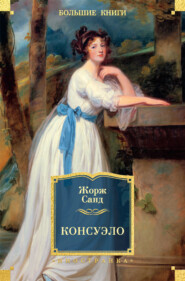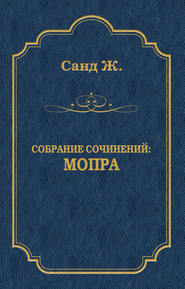По всем вопросам обращайтесь на: info@litportal.ru
(©) 2003-2025.
✖
The George Sand-Gustave Flaubert Letters
Настройки чтения
Размер шрифта
Высота строк
Поля
I have received your volume this morning, dear master. I have two or three others that have been loaned to me for a long time; I shall send them off, and I shall read yours at the end of the week, during a little two-days' trip that I am forced to take to Pont-l'Eveque and to Honfleur for my Histoire d'un coeur simple, a trifle now "on the stocks," as M. Prudhomme would say.
I am very glad that Jack has pleased you. It is a charming book, isn't it? If you knew the author you would like him even better than his book. I have told him to send you Risler and Tartarin. I am sure in advance that you would thank me for the opportunity of reading these two books.
I do not share in Tourgueneff's severity as regards Jack, nor in the immensity of his admiration for Rougon. The one has charm, the other force. But neither one is concerned ABOVE ALL else with what is for me the end of art, namely, beauty. I remember having felt my heart beat violently, having felt a fierce pleasure in contemplating a wall of the Acropolis, a perfectly bare wall (the one on the left as you go up to the Propylaea). Well! I wonder if a book independently of what it says, cannot produce the same effect! In the exactness of its assembling, the rarity of its elements, the polish of its surface, the harmony of its ensemble, is there not an intrinsic virtue, a sort of divine force, something eternal as a principle? (I speak as a Platonist.) Thus, why is a relation necessary between the exact word and the musical word? Why does it happen that one always makes a verse when one restrains his thought too much? Does the law of numbers govern then the feelings and the images, and is what seems to be the exterior quite simply inside it? If I should continue a long time in this vein, I should blind myself entirely, for on the other side art has to be a good fellow; or rather art is what one can make it, we are not free. Each one follows his path, in spite of his own desire. In short, your Cruchard no longer knows where he stands.
But how difficult it is to understand one another! There are two men whom I admire a great deal and whom I consider real artists, Tourgueneff and Zola. Yet they do not admire the prose of Chateaubriand at all, and even less that of Gautier. Phrases which ravish me seem hollow to them. Who is wrong? And how please the public when one's nearest friends are so remote? All that saddens me very much. Do not laugh.
CCCIX. TO GEORGE SAND
Sunday evening… 1876
You OUGHT to call me inwardly, dear master, "a confounded pig," – for I have not answered your last letter, and I have said nothing to you about your two volumes, not to mention a third that I received this morning from you. But I have been, for the last two weeks, entirely taken up by my little tale which will be finished soon. I have had several errands to do, various readings to finish up with, and a thing more serious than all that, the health of my poor niece worries me extremely and, at times, disturbs my brain, so that I do not know at all what I am doing! You see that my cup is bitter! That young woman is anemic to the last degree. She is wasting away. She has been obliged to leave off painting, which is her sole distraction. All the usual tonics do no good. Three days ago, by the orders of another physician, who seems to me more learned than the others, she began hydrotherapy. Will he succeed in making her digest and sleep? in building up her strength? Your poor Cruchard takes less and less pleasure in life, and he even has too much of it, infinitely too much. Let us speak of your books, that will be better.
They have amused me, and the proof is that I have devoured with one gulp and one after another, Flamarande and the Deux Freres. What a charming woman is Madame Flamarande, and what a man is M. Salcede. The narrative of the kidnapping of the child, the trip in the carriage, and the story of Zamora are perfect passages. Everywhere the interest is sustained and at the same time progressive. In short, what strikes me the most in these two novels (as in all yours, moreover), is the natural order of the ideas, the talent, or rather the genius for narrative. But what an abominable wretch is your M. Flamarande! As for the servant who tells the story and who is evidently in love with Madame, I wonder why you did not show more plainly his personal jealousy.
Except for the count, all are virtuous persons in that story, even extraordinarily virtuous. But do you think them really true to life? Are there many like them? It is true that while reading, one accepts them because of the cleverness of the execution; but afterwards?
Well, dear master, and this is to answer your last letter, this is, I think what separates us essentially. You, on the first bound, in everything, mount to heaven, and from there you descend to the earth. You start from a priori, from the theory, from the ideal. Thence your pity for life, your serenity, and to speak truly, your greatness. – I, poor wretch, I am stuck on the earth as with soles of lead; everything disturbs me, tears me to pieces, ravages me, and I make efforts to rise. If I should take your manner of looking at the whole of life I should become laughable, that is all. For you preach to me in vain. I cannot have another temperament than my own; nor another esthetics than what is the consequence of it. You accuse me of not letting myself go, according to nature. Well, and that discipline? that virtue? what shall we do with it? I admire M. Buffon putting on cuffs when he wrote. This luxury is a symbol. In short I am trying simply to be as comprehensive as possible. What more can one exact?
As for letting my personal opinion be known about the people I put on the stage: no, no, a thousand times no! I do not recognize the right to that. If the reader does not draw from a book the moral that should be found there, the reader is an imbecile or the book is false from the point of view of accuracy. For, the moment that a thing is true, it is good. Obscene books likewise are immoral only because they lack truth. Things are not "like that" in life.
And observe that I curse what they agree to call realism, although they make me one of its high priests; reconcile all that.
As for the public, its taste disgusts me more and more. Yesterday, for instance, I was present at the first night of the Prix Martin, a piece of buffoonery that, for my part, I think full of wit. Not one of the witty things in the play produced a laugh, and the denouement, which seems out of the ordinary, passed unperceived. Then to look for what can please seems to me the most chimerical of undertakings. For I defy anyone to tell me by what means one pleases. Success is a consequence and must not be an end. I have never sought it (although I desire it) and I seek it less and less.
After my little story, I shall do another, – for I am too deeply shaken to start on a great work. I had thought first of publishing Saint-Julien in a periodical, but I have given the plan up.
CCCX. TO GEORGE SAND
Friday evening…1876
Ah! thank you from the bottom of my heart, dear master! You have made me pass an exquisite day, for I have read your last volume, la Tour de Percemont. – Marianne only to-day; as I had many things to finish, among others my tale of Saint-Julien, I had shut up the aforesaid volume in a drawer so as not to succumb to the temptation. As my little story was finished last night, I rushed upon your book when morning came and devoured it.
I find it perfect, two jewels! Marianne moved me deeply and two or three times I wept. I recognized myself in the character of Pierre. Certain pages seemed to me fragments of my own memoirs, supposing I had the talent to write them in such a way! How charming, poetic and true to life all that is! La Tour de Percemont pleased me extremely. But Marianne literally enchanted me. The English think as I do, for in the last number of the Athenaeum there is a very fine article about you. Did you know that? So then, for this time, I admire you completely and without the least reserve.
There you are, and I am very glad of it. You have never done anything to me that was not good; I love you tenderly!
CCCXI. TO GUSTAVE FLAUBERT
Sunday, Nohant, 5th April, 1876.
Victor Borie is in Italy, what must I write him? Are you the man to go to find him and explain the affair to him? He is somewhere near Civita-Vecchia, very much on the go and perhaps not easy to catch up with.
I am sure that he would receive you with open arms, for, although a financier to his finger-tips he has remained very friendly and nice to us. He does not tell us if he is on his mountain of alum for long. Lina is writing to him and will know soon, shall she tell him that you are disposed to go to meet him, or that you will wait until his return to Paris? anyway until the 20th of May he will get letters addressed to him at the Hotel Italy in Florence. We shall have to be on the watch, for he writes AT LONG INTERVALS.
I have not the time to say any more to you today. People are coming in. I have read Fromont et Risler; I charge you to thank M. Daudet, to tell him that I spent the night in reading it and that I do not know whether I prefer Jack or Risler; it is interesting, I might almost say GRIPPING.
I embrace you and I love you, when will you give me some Flaubert to read?
G. Sand
CCCXII. To GEOBGE SAND
Monday evening
Dear master, Thanks to Madame Lina's kind note, I betook myself to V. Borie's yesterday and was most pleasantly received. My nephew went to carry him the documents today. Borie has promised to look after the affair; will he do it?
I think that he is in just the position to do me indirectly the greatest service that any one could do me. If my poor nephew should get the capital which he needs in order to work, I could get back a part of what I have lost and live in peace the rest of my days.
I presented myself to Borie under your recommendation, and it is to you that I owe the cordiality of his reception. I do not thank you (of course) but you can tell him that I was touched by his kind reception (and stimulate his zeal if you think that may be useful).
I have been working a great deal lately. How I should like to see you so as to read my little medieval folly to you! I have begun another story entitled Histoire d'un coeur simple. But I have interrupted this work to make some researches on the period of Saint John the Baptist, for I want to describe the feast of Herodias.
I hope to have my readings finished in a fortnight, after which I shall return to Croisset from which spot I shall not budge till winter, – my long sessions at the library exhaust me. Cruchard is weary.
The good Tourgueneff leaves this evening for Saint Petersburg. He asks me if I have thanked you for your last book? Could I be guilty of such an oversight? You will see by my Histoire d'un coeur simple where you will recognize your immediate influence, that I am not so obstinate as you think. I believe that the moral tendency, or rather the human basis of this little work will please you!
Adieu, dear good master. Remembrances to all yours.
I embrace you very tenderly.
Your old Gustave Flaubert
CCCXIII. To MAURICE SAND
Tuesday evening, 27th
All I can say to you, in the first place, my dear friend, is, that your book has made me pass a sleepless night. I read it instantly, at one fell swoop, only stopping to fill my good pipe from time to time and then to resume my reading.
When the impression is a little less fresh I shall take up your book again to find the flaws in it. But I think that there are very few. You must be content? It ought to please? It is dramatic and as amusing as possible!
Beginning with the first page I was charmed with the sincerity of the description. And at the end I admired the composition of the whole, the logical way the events were worked out and the characters related.
Your chief character, Miss Mary, is too hateful (to my taste) to be anything but an exact picture. That is one of the choicest parts of your book, together with the homelife, the life in New York?
Your good savage makes me laugh out loud when he is at the Opera.
I was struck by the house of the missionaries (Montaret's first night). You make it seem real. Naissa scalping, and then wiping her hands on the grass, seemed to me especially well done. As well as the disgust that she inspires in Montaret,
I venture a timid observation: it seems to me that the flight of father Athanasius and of Montaret, when they escape from their prison, is not perfectly clear? Is not the material explanation of the event too short?
I do not care for, as language, two or three ready-made locutions, such as "break the ice." You can see that I have read you attentively! What a pedagogue I make, eh! I am telling you all that from memory, for I have lent your book, and it has not been returned to me yet. But my recollection of it is of a thing very well done.
Don't you agree with me that a play of very great effect could be made from it for a boulevard theatre?
By the way, how is Cadio going?
Tell your dear mamma that I adore her.

















